Business Law Report: UK Legal System, Sources, and Commercial Impact
VerifiedAdded on 2023/06/07
|5
|1456
|285
Report
AI Summary
This report delves into the UK's legal system, examining its classifications, sources, and impact on commercial organizations. It begins by defining law and outlining its classifications, including public and private law, as well as civil and criminal law. The report then explores the UK's legal system, including England and Wales, Scotland, and Northern Ireland, highlighting the distinct legal frameworks within each jurisdiction. The core of the report identifies and explains the hierarchy of principal sources of law in the English Legal System, such as legislation, case law, and human rights laws. It further discusses the characteristics of these sources, providing examples for each, and analyzes their impact on multilingual organizations. Finally, the report provides examples of how the UK law-making process directly affects commercial organizations, particularly focusing on contract law and its essential elements. The report concludes with a list of references used.
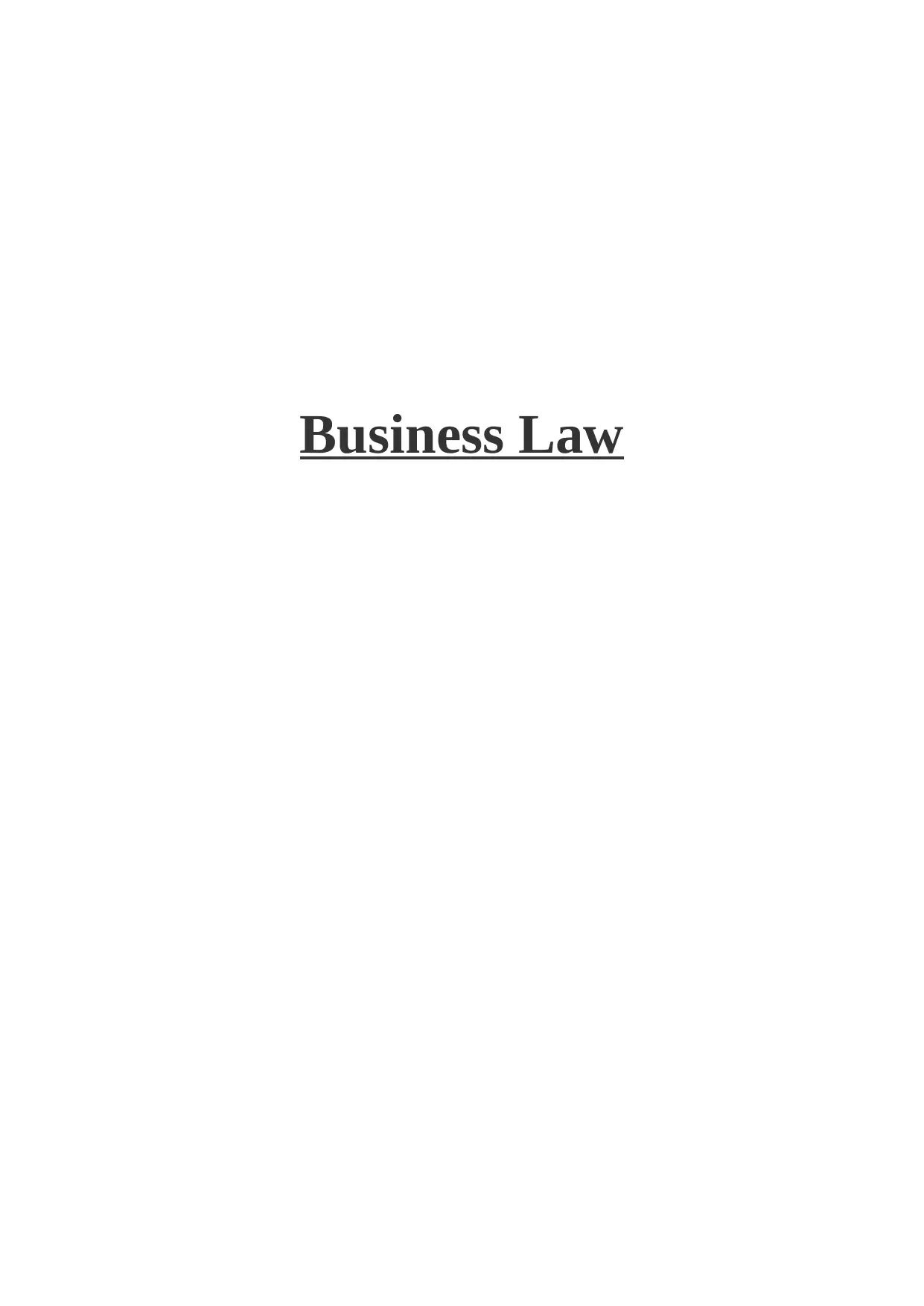
Business Law
Paraphrase This Document
Need a fresh take? Get an instant paraphrase of this document with our AI Paraphraser
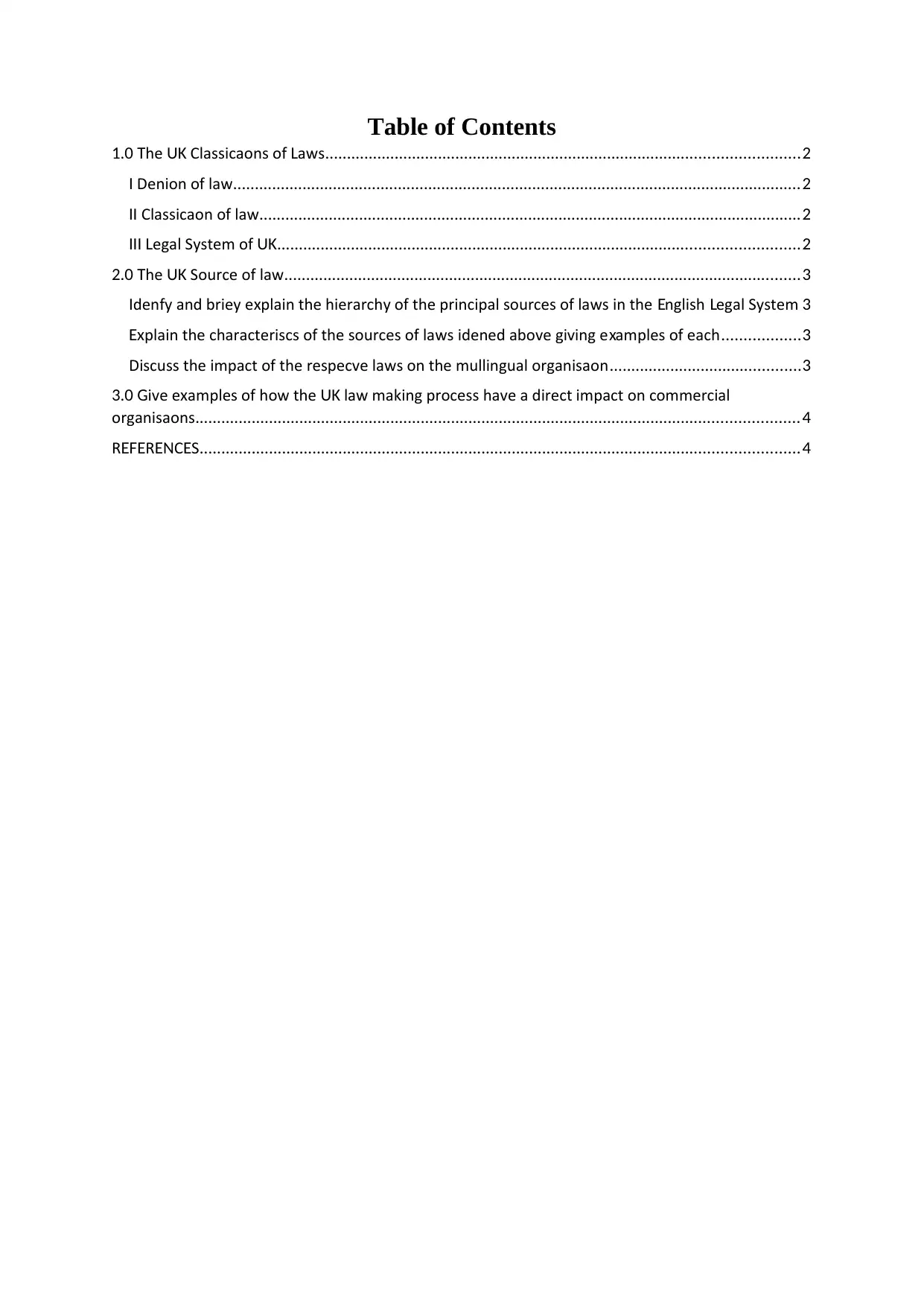
Table of Contents
he Classifications of aws1.0 T UK L .............................................................................................................2
Definition of lawI ...................................................................................................................................2
Classification of lawII .............................................................................................................................2
egal System ofIII L UK........................................................................................................................2
he Source of law2.0 T UK .......................................................................................................................3
dentify and briefly e plain the hierarchy of the principal sources of laws in the nglish egal SystemI x E L 3
plain the characteristics of the sources of laws identified above giving e amples of eachEx x ..................3
Discuss the impact of the respective laws on the multilingual organisation............................................3
ive e amples of how the law making process have a direct impact on commercial3.0 G x UK
organisations...........................................................................................................................................4
R R C SEFE EN E ..........................................................................................................................................4
he Classifications of aws1.0 T UK L .............................................................................................................2
Definition of lawI ...................................................................................................................................2
Classification of lawII .............................................................................................................................2
egal System ofIII L UK........................................................................................................................2
he Source of law2.0 T UK .......................................................................................................................3
dentify and briefly e plain the hierarchy of the principal sources of laws in the nglish egal SystemI x E L 3
plain the characteristics of the sources of laws identified above giving e amples of eachEx x ..................3
Discuss the impact of the respective laws on the multilingual organisation............................................3
ive e amples of how the law making process have a direct impact on commercial3.0 G x UK
organisations...........................................................................................................................................4
R R C SEFE EN E ..........................................................................................................................................4
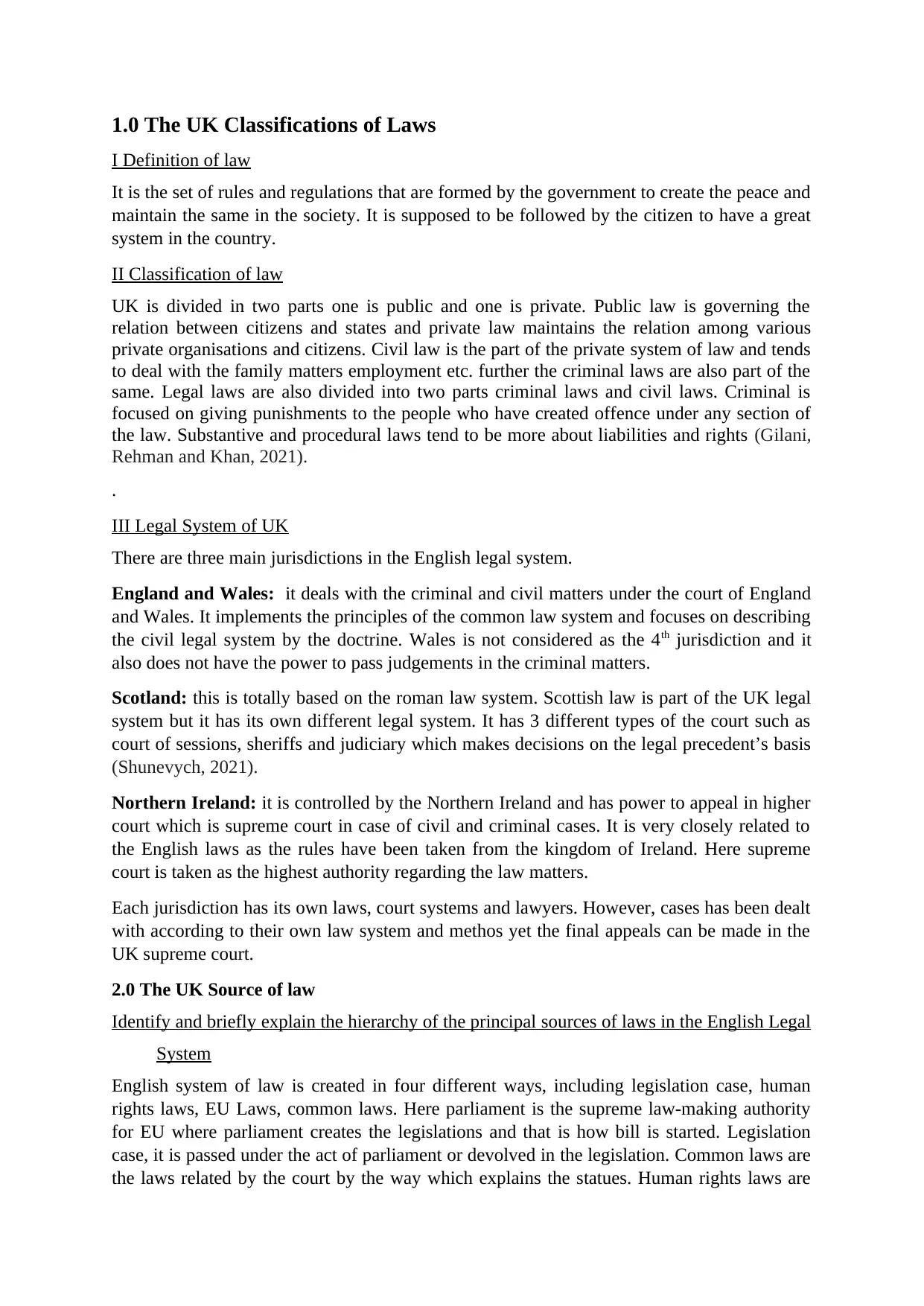
1.0 The UK Classifications of Laws
I Definition of law
It is the set of rules and regulations that are formed by the government to create the peace and
maintain the same in the society. It is supposed to be followed by the citizen to have a great
system in the country.
II Classification of law
UK is divided in two parts one is public and one is private. Public law is governing the
relation between citizens and states and private law maintains the relation among various
private organisations and citizens. Civil law is the part of the private system of law and tends
to deal with the family matters employment etc. further the criminal laws are also part of the
same. Legal laws are also divided into two parts criminal laws and civil laws. Criminal is
focused on giving punishments to the people who have created offence under any section of
the law. Substantive and procedural laws tend to be more about liabilities and rights (Gilani,
Rehman and Khan, 2021).
.
III Legal System of UK
There are three main jurisdictions in the English legal system.
England and Wales: it deals with the criminal and civil matters under the court of England
and Wales. It implements the principles of the common law system and focuses on describing
the civil legal system by the doctrine. Wales is not considered as the 4th jurisdiction and it
also does not have the power to pass judgements in the criminal matters.
Scotland: this is totally based on the roman law system. Scottish law is part of the UK legal
system but it has its own different legal system. It has 3 different types of the court such as
court of sessions, sheriffs and judiciary which makes decisions on the legal precedent’s basis
(Shunevych, 2021).
Northern Ireland: it is controlled by the Northern Ireland and has power to appeal in higher
court which is supreme court in case of civil and criminal cases. It is very closely related to
the English laws as the rules have been taken from the kingdom of Ireland. Here supreme
court is taken as the highest authority regarding the law matters.
Each jurisdiction has its own laws, court systems and lawyers. However, cases has been dealt
with according to their own law system and methos yet the final appeals can be made in the
UK supreme court.
2.0 The UK Source of law
Identify and briefly explain the hierarchy of the principal sources of laws in the English Legal
System
English system of law is created in four different ways, including legislation case, human
rights laws, EU Laws, common laws. Here parliament is the supreme law-making authority
for EU where parliament creates the legislations and that is how bill is started. Legislation
case, it is passed under the act of parliament or devolved in the legislation. Common laws are
the laws related by the court by the way which explains the statues. Human rights laws are
I Definition of law
It is the set of rules and regulations that are formed by the government to create the peace and
maintain the same in the society. It is supposed to be followed by the citizen to have a great
system in the country.
II Classification of law
UK is divided in two parts one is public and one is private. Public law is governing the
relation between citizens and states and private law maintains the relation among various
private organisations and citizens. Civil law is the part of the private system of law and tends
to deal with the family matters employment etc. further the criminal laws are also part of the
same. Legal laws are also divided into two parts criminal laws and civil laws. Criminal is
focused on giving punishments to the people who have created offence under any section of
the law. Substantive and procedural laws tend to be more about liabilities and rights (Gilani,
Rehman and Khan, 2021).
.
III Legal System of UK
There are three main jurisdictions in the English legal system.
England and Wales: it deals with the criminal and civil matters under the court of England
and Wales. It implements the principles of the common law system and focuses on describing
the civil legal system by the doctrine. Wales is not considered as the 4th jurisdiction and it
also does not have the power to pass judgements in the criminal matters.
Scotland: this is totally based on the roman law system. Scottish law is part of the UK legal
system but it has its own different legal system. It has 3 different types of the court such as
court of sessions, sheriffs and judiciary which makes decisions on the legal precedent’s basis
(Shunevych, 2021).
Northern Ireland: it is controlled by the Northern Ireland and has power to appeal in higher
court which is supreme court in case of civil and criminal cases. It is very closely related to
the English laws as the rules have been taken from the kingdom of Ireland. Here supreme
court is taken as the highest authority regarding the law matters.
Each jurisdiction has its own laws, court systems and lawyers. However, cases has been dealt
with according to their own law system and methos yet the final appeals can be made in the
UK supreme court.
2.0 The UK Source of law
Identify and briefly explain the hierarchy of the principal sources of laws in the English Legal
System
English system of law is created in four different ways, including legislation case, human
rights laws, EU Laws, common laws. Here parliament is the supreme law-making authority
for EU where parliament creates the legislations and that is how bill is started. Legislation
case, it is passed under the act of parliament or devolved in the legislation. Common laws are
the laws related by the court by the way which explains the statues. Human rights laws are
⊘ This is a preview!⊘
Do you want full access?
Subscribe today to unlock all pages.

Trusted by 1+ million students worldwide
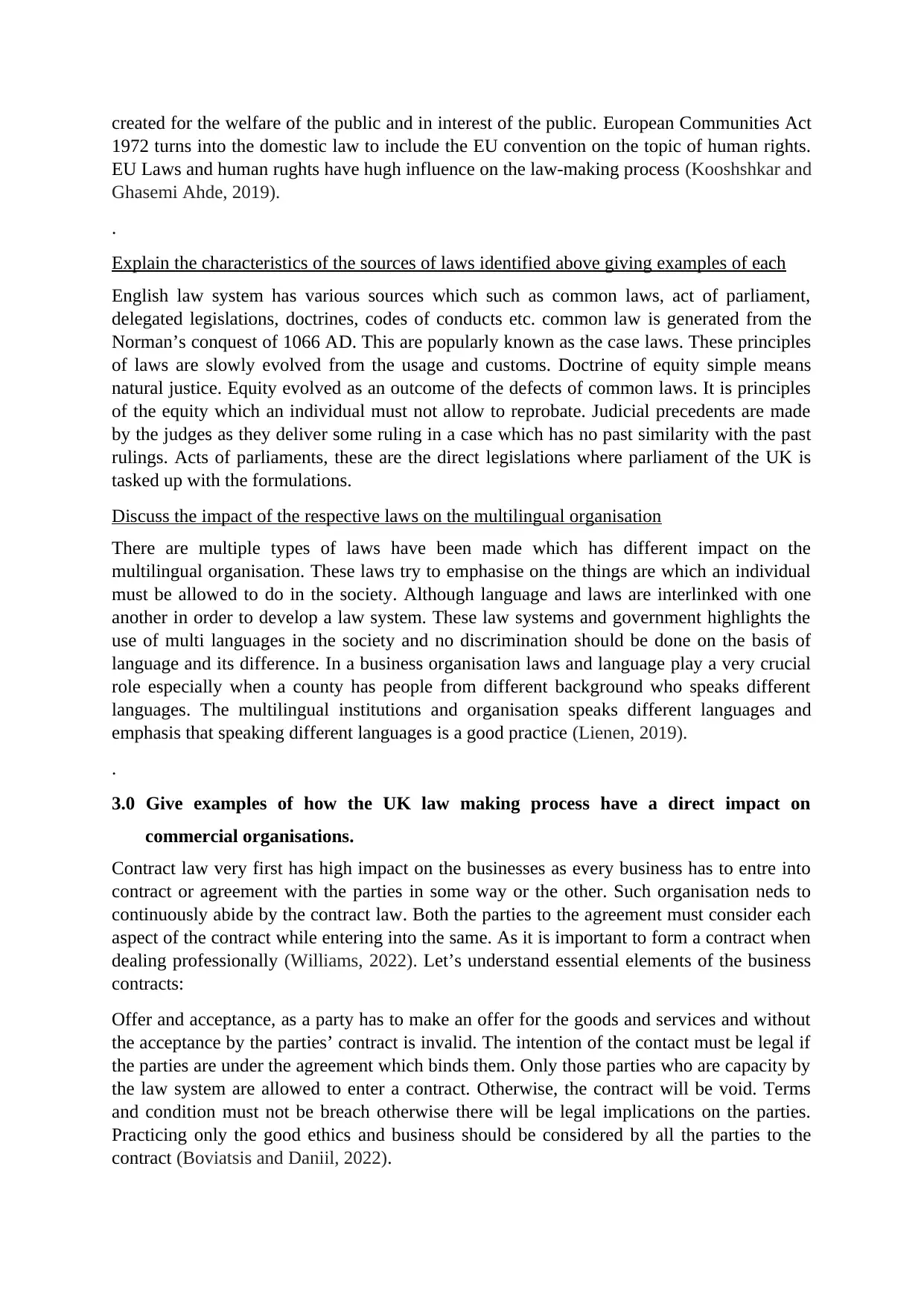
created for the welfare of the public and in interest of the public. European Communities Act
1972 turns into the domestic law to include the EU convention on the topic of human rights.
EU Laws and human rughts have hugh influence on the law-making process (Kooshshkar and
Ghasemi Ahde, 2019).
.
Explain the characteristics of the sources of laws identified above giving examples of each
English law system has various sources which such as common laws, act of parliament,
delegated legislations, doctrines, codes of conducts etc. common law is generated from the
Norman’s conquest of 1066 AD. This are popularly known as the case laws. These principles
of laws are slowly evolved from the usage and customs. Doctrine of equity simple means
natural justice. Equity evolved as an outcome of the defects of common laws. It is principles
of the equity which an individual must not allow to reprobate. Judicial precedents are made
by the judges as they deliver some ruling in a case which has no past similarity with the past
rulings. Acts of parliaments, these are the direct legislations where parliament of the UK is
tasked up with the formulations.
Discuss the impact of the respective laws on the multilingual organisation
There are multiple types of laws have been made which has different impact on the
multilingual organisation. These laws try to emphasise on the things are which an individual
must be allowed to do in the society. Although language and laws are interlinked with one
another in order to develop a law system. These law systems and government highlights the
use of multi languages in the society and no discrimination should be done on the basis of
language and its difference. In a business organisation laws and language play a very crucial
role especially when a county has people from different background who speaks different
languages. The multilingual institutions and organisation speaks different languages and
emphasis that speaking different languages is a good practice (Lienen, 2019).
.
3.0 Give examples of how the UK law making process have a direct impact on
commercial organisations.
Contract law very first has high impact on the businesses as every business has to entre into
contract or agreement with the parties in some way or the other. Such organisation neds to
continuously abide by the contract law. Both the parties to the agreement must consider each
aspect of the contract while entering into the same. As it is important to form a contract when
dealing professionally (Williams, 2022). Let’s understand essential elements of the business
contracts:
Offer and acceptance, as a party has to make an offer for the goods and services and without
the acceptance by the parties’ contract is invalid. The intention of the contact must be legal if
the parties are under the agreement which binds them. Only those parties who are capacity by
the law system are allowed to enter a contract. Otherwise, the contract will be void. Terms
and condition must not be breach otherwise there will be legal implications on the parties.
Practicing only the good ethics and business should be considered by all the parties to the
contract (Boviatsis and Daniil, 2022).
1972 turns into the domestic law to include the EU convention on the topic of human rights.
EU Laws and human rughts have hugh influence on the law-making process (Kooshshkar and
Ghasemi Ahde, 2019).
.
Explain the characteristics of the sources of laws identified above giving examples of each
English law system has various sources which such as common laws, act of parliament,
delegated legislations, doctrines, codes of conducts etc. common law is generated from the
Norman’s conquest of 1066 AD. This are popularly known as the case laws. These principles
of laws are slowly evolved from the usage and customs. Doctrine of equity simple means
natural justice. Equity evolved as an outcome of the defects of common laws. It is principles
of the equity which an individual must not allow to reprobate. Judicial precedents are made
by the judges as they deliver some ruling in a case which has no past similarity with the past
rulings. Acts of parliaments, these are the direct legislations where parliament of the UK is
tasked up with the formulations.
Discuss the impact of the respective laws on the multilingual organisation
There are multiple types of laws have been made which has different impact on the
multilingual organisation. These laws try to emphasise on the things are which an individual
must be allowed to do in the society. Although language and laws are interlinked with one
another in order to develop a law system. These law systems and government highlights the
use of multi languages in the society and no discrimination should be done on the basis of
language and its difference. In a business organisation laws and language play a very crucial
role especially when a county has people from different background who speaks different
languages. The multilingual institutions and organisation speaks different languages and
emphasis that speaking different languages is a good practice (Lienen, 2019).
.
3.0 Give examples of how the UK law making process have a direct impact on
commercial organisations.
Contract law very first has high impact on the businesses as every business has to entre into
contract or agreement with the parties in some way or the other. Such organisation neds to
continuously abide by the contract law. Both the parties to the agreement must consider each
aspect of the contract while entering into the same. As it is important to form a contract when
dealing professionally (Williams, 2022). Let’s understand essential elements of the business
contracts:
Offer and acceptance, as a party has to make an offer for the goods and services and without
the acceptance by the parties’ contract is invalid. The intention of the contact must be legal if
the parties are under the agreement which binds them. Only those parties who are capacity by
the law system are allowed to enter a contract. Otherwise, the contract will be void. Terms
and condition must not be breach otherwise there will be legal implications on the parties.
Practicing only the good ethics and business should be considered by all the parties to the
contract (Boviatsis and Daniil, 2022).
Paraphrase This Document
Need a fresh take? Get an instant paraphrase of this document with our AI Paraphraser
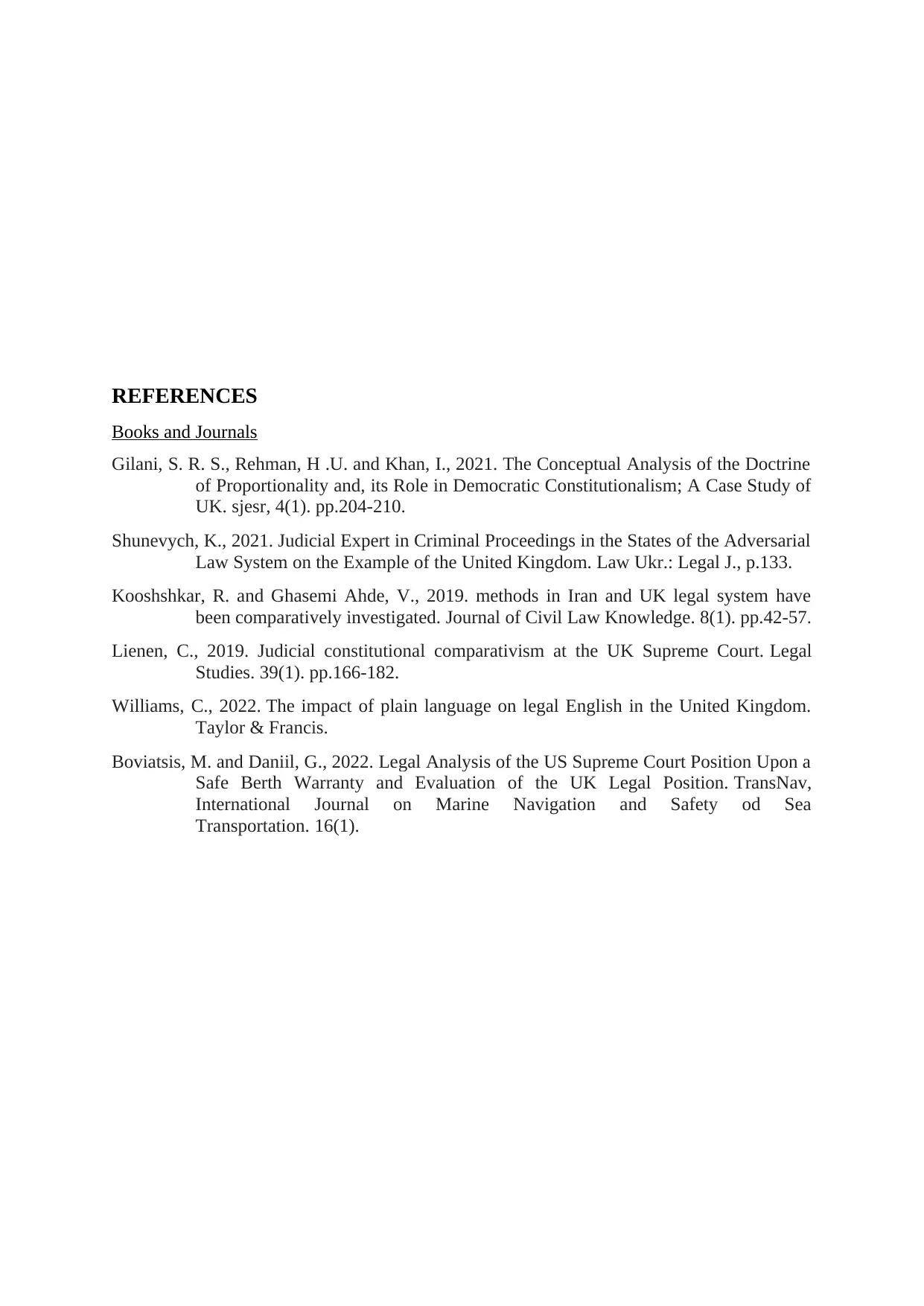
REFERENCES
Books and Journals
Gilani, S. R. S., Rehman, H .U. and Khan, I., 2021. The Conceptual Analysis of the Doctrine
of Proportionality and, its Role in Democratic Constitutionalism; A Case Study of
UK. sjesr, 4(1). pp.204-210.
Shunevych, K., 2021. Judicial Expert in Criminal Proceedings in the States of the Adversarial
Law System on the Example of the United Kingdom. Law Ukr.: Legal J., p.133.
Kooshshkar, R. and Ghasemi Ahde, V., 2019. methods in Iran and UK legal system have
been comparatively investigated. Journal of Civil Law Knowledge. 8(1). pp.42-57.
Lienen, C., 2019. Judicial constitutional comparativism at the UK Supreme Court. Legal
Studies. 39(1). pp.166-182.
Williams, C., 2022. The impact of plain language on legal English in the United Kingdom.
Taylor & Francis.
Boviatsis, M. and Daniil, G., 2022. Legal Analysis of the US Supreme Court Position Upon a
Safe Berth Warranty and Evaluation of the UK Legal Position. TransNav,
International Journal on Marine Navigation and Safety od Sea
Transportation. 16(1).
Books and Journals
Gilani, S. R. S., Rehman, H .U. and Khan, I., 2021. The Conceptual Analysis of the Doctrine
of Proportionality and, its Role in Democratic Constitutionalism; A Case Study of
UK. sjesr, 4(1). pp.204-210.
Shunevych, K., 2021. Judicial Expert in Criminal Proceedings in the States of the Adversarial
Law System on the Example of the United Kingdom. Law Ukr.: Legal J., p.133.
Kooshshkar, R. and Ghasemi Ahde, V., 2019. methods in Iran and UK legal system have
been comparatively investigated. Journal of Civil Law Knowledge. 8(1). pp.42-57.
Lienen, C., 2019. Judicial constitutional comparativism at the UK Supreme Court. Legal
Studies. 39(1). pp.166-182.
Williams, C., 2022. The impact of plain language on legal English in the United Kingdom.
Taylor & Francis.
Boviatsis, M. and Daniil, G., 2022. Legal Analysis of the US Supreme Court Position Upon a
Safe Berth Warranty and Evaluation of the UK Legal Position. TransNav,
International Journal on Marine Navigation and Safety od Sea
Transportation. 16(1).
1 out of 5
Related Documents
Your All-in-One AI-Powered Toolkit for Academic Success.
+13062052269
info@desklib.com
Available 24*7 on WhatsApp / Email
![[object Object]](/_next/static/media/star-bottom.7253800d.svg)
Unlock your academic potential
Copyright © 2020–2026 A2Z Services. All Rights Reserved. Developed and managed by ZUCOL.




